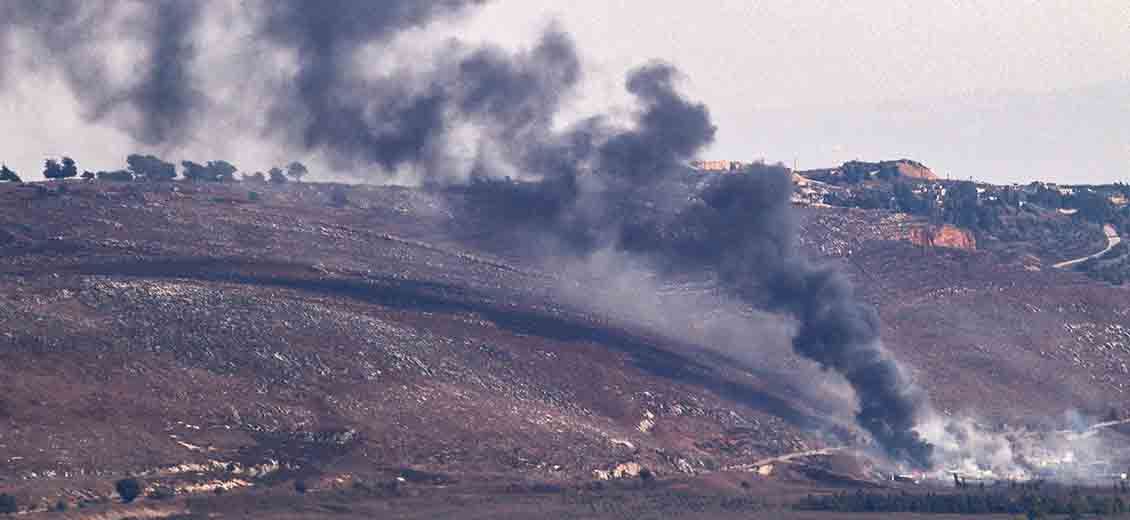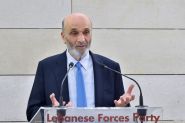
©RABIH DAHER/AFP
Spiraling Israeli attacks on several Lebanese towns in the south and Bekaa in east Lebanon, claimed the lives of 51 people and wounded 220 on Wednesday, according to a provisional toll announced by the Ministry of Public Health.
In the meantime, Hezbollah announced the death of four of its combatants, identified as Muhammad Hussein Ali al-Rabah and Hussein Ahmad Awali, Ali Hassan Hammoud, Abbas Ibrahim Charafeddin.
In Nabatiye, notably in the Kfar Remmane and Bir Salasel areas, Israeli strikes were particularly intense. In the same caza, the village of Kfar Joz was targeted, causing damage to the government hospital.
Two raids targeted Maaysara, in Kesrouan district, north of Beirut, 100 kilometers from the border. Three people were reportedly killed and a house destroyed. Sheikh Mohammad Amr, a local Hezbollah official for the North and Mount Lebanon, was the intended target of the raid.
The Israeli army had announced plans for extensive attacks in the South and the Bekaa, as the air force broke the sound barrier in multiple locations.
A series of raids were also carried out in the morning against Iqlim al-Touffah, Toueiti, Sarafand, Zararia, Laboue, Nabi Othman, the central Bekaa valley, Zahrani, where oil installations are located, the locality of Joun, the village of Aramta and against Hermel, where 4 people were killed and 38 wounded. Israeli military aircraft have also broken the sound barrier on several occasions.
The regions of Tebnine, Houmine, Roumine, Sawané, Qabrikha, Kantara, Nmeyriyé, Ansar, Aïtaroun and Bazouriyé were also targeted.
Al-Manar TV photojournalist Kamel Karaki was also killed in Israeli air strikes on the village of Qantara.
Three Israeli raids were also carried out on the outskirts of Arnoun. Eleven localities in the southern sector, including Naqoura, Qleilé, Arabsalim and Habbouche, were also the target of a new series of strikes, while the areas of Kfar Remmane, Jmeijmé, Froun and Sawané were bombed. The Bekaa was not spared either, with strikes against Machghara, Douress and the Lebbaya plain.
At dawn, the localities of Brital, Baalbeck, Haouch el-Rafqa, Khoder, Riyak, as well as the heights of Nabi Chit and Jenta and the plains of Saraïne and Laboué were targeted.
In Israel, 30 rockets launched from Lebanon towards Galilee were intercepted. According to Haaretz, sirens sounded on Wednesday morning in the Zikhron Yaakov region, south of Haifa, as well as in the Carmel region, east of the major port city.
According to the Israeli army, five rockets fired from Lebanon into this area were intercepted, and at least one fell on Israeli territory. Israel's largest electricity supplier, Israel Electric Corporation, announced that one of its strategic infrastructures had been targeted by Hezbollah, but no damage was reported.
Hezbollah declared in a statement early morning Wednesday that it had targeted the Mossad headquarters on the outskirts of Tel Aviv with a Qader-1 ballistic missile. According to the pro-Iranian group, this was the infrastructure behind the assassination of its commanders and the explosion of its beepers and walkie-talkies on September 17 and 18, by a remote attack.
According to an Israeli army spokesman, alarms went off in Tel Aviv following the launch from Lebanon of a ground-to-ground missile which was intercepted by Israeli air defenses.
In the meantime, Hezbollah announced the death of four of its combatants, identified as Muhammad Hussein Ali al-Rabah and Hussein Ahmad Awali, Ali Hassan Hammoud, Abbas Ibrahim Charafeddin.
In Nabatiye, notably in the Kfar Remmane and Bir Salasel areas, Israeli strikes were particularly intense. In the same caza, the village of Kfar Joz was targeted, causing damage to the government hospital.
Two raids targeted Maaysara, in Kesrouan district, north of Beirut, 100 kilometers from the border. Three people were reportedly killed and a house destroyed. Sheikh Mohammad Amr, a local Hezbollah official for the North and Mount Lebanon, was the intended target of the raid.
The Israeli army had announced plans for extensive attacks in the South and the Bekaa, as the air force broke the sound barrier in multiple locations.
A series of raids were also carried out in the morning against Iqlim al-Touffah, Toueiti, Sarafand, Zararia, Laboue, Nabi Othman, the central Bekaa valley, Zahrani, where oil installations are located, the locality of Joun, the village of Aramta and against Hermel, where 4 people were killed and 38 wounded. Israeli military aircraft have also broken the sound barrier on several occasions.
The regions of Tebnine, Houmine, Roumine, Sawané, Qabrikha, Kantara, Nmeyriyé, Ansar, Aïtaroun and Bazouriyé were also targeted.
Al-Manar TV photojournalist Kamel Karaki was also killed in Israeli air strikes on the village of Qantara.
Three Israeli raids were also carried out on the outskirts of Arnoun. Eleven localities in the southern sector, including Naqoura, Qleilé, Arabsalim and Habbouche, were also the target of a new series of strikes, while the areas of Kfar Remmane, Jmeijmé, Froun and Sawané were bombed. The Bekaa was not spared either, with strikes against Machghara, Douress and the Lebbaya plain.
At dawn, the localities of Brital, Baalbeck, Haouch el-Rafqa, Khoder, Riyak, as well as the heights of Nabi Chit and Jenta and the plains of Saraïne and Laboué were targeted.
In Israel, 30 rockets launched from Lebanon towards Galilee were intercepted. According to Haaretz, sirens sounded on Wednesday morning in the Zikhron Yaakov region, south of Haifa, as well as in the Carmel region, east of the major port city.
According to the Israeli army, five rockets fired from Lebanon into this area were intercepted, and at least one fell on Israeli territory. Israel's largest electricity supplier, Israel Electric Corporation, announced that one of its strategic infrastructures had been targeted by Hezbollah, but no damage was reported.
Hezbollah declared in a statement early morning Wednesday that it had targeted the Mossad headquarters on the outskirts of Tel Aviv with a Qader-1 ballistic missile. According to the pro-Iranian group, this was the infrastructure behind the assassination of its commanders and the explosion of its beepers and walkie-talkies on September 17 and 18, by a remote attack.
According to an Israeli army spokesman, alarms went off in Tel Aviv following the launch from Lebanon of a ground-to-ground missile which was intercepted by Israeli air defenses.
Read more



Comments